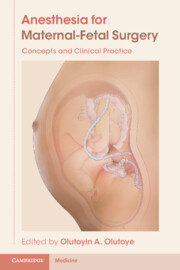Book contents
- Anesthesia for Maternal-Fetal Surgery
- Anesthesia for Maternal-Fetal Surgery
- Copyright page
- Dedication
- Contents
- Contributors
- Abbreviations
- Preface
- Acknowledgments
- Section 1
- Chapter 1 Physiology of Pregnancy
- Chapter 2 Fetal Physiology and Fetal Pain
- Chapter 3 Ethical Considerations for Maternal-Fetal Surgery
- Chapter 4 Multidisciplinary Approach to Fetal Surgery
- Chapter 5 Intrauterine Transfusion
- Section 2
- Section 3
- Index
- Endmatter
- References
Chapter 2 - Fetal Physiology and Fetal Pain
from Section 1
Published online by Cambridge University Press: 19 November 2021
- Anesthesia for Maternal-Fetal Surgery
- Anesthesia for Maternal-Fetal Surgery
- Copyright page
- Dedication
- Contents
- Contributors
- Abbreviations
- Preface
- Acknowledgments
- Section 1
- Chapter 1 Physiology of Pregnancy
- Chapter 2 Fetal Physiology and Fetal Pain
- Chapter 3 Ethical Considerations for Maternal-Fetal Surgery
- Chapter 4 Multidisciplinary Approach to Fetal Surgery
- Chapter 5 Intrauterine Transfusion
- Section 2
- Section 3
- Index
- Endmatter
- References
Summary
The uterus serves as an incubator for the fetus during pregnancy. Within this incubator, the placenta is the main connection between the mother and the fetus and is integral to the survival of the fetus as it is an important source of fetal nutrients and oxygen. The proper development of the placenta allows it to support the fetus throughout pregnancy and expulsion or removal of a normal placenta following delivery, helps prevent postpartum complications. Maintenance of uteroplacental flow during pregnancy and during fetal surgery is important for the survival of the fetus and especially for the remainder of the pregnancy following fetal surgery. Serial monitoring of umbilical artery flow, a marker for uteroplacental insufficiency, is helpful to monitor fetal well-being. Physiology of the fetus correlates with the different stages of development in different organs and in many instances changes at delivery. The prevention of pain or the effects of noxious stimuli during fetal surgery serves many benefits, which include but are not limited to, prevention of release of stress hormones which can play a role in preterm labor and also prevention of long-term neurodevelopmental effects in the fetus.
Keywords
- Type
- Chapter
- Information
- Anesthesia for Maternal-Fetal SurgeryConcepts and Clinical Practice, pp. 17 - 36Publisher: Cambridge University PressPrint publication year: 2021

